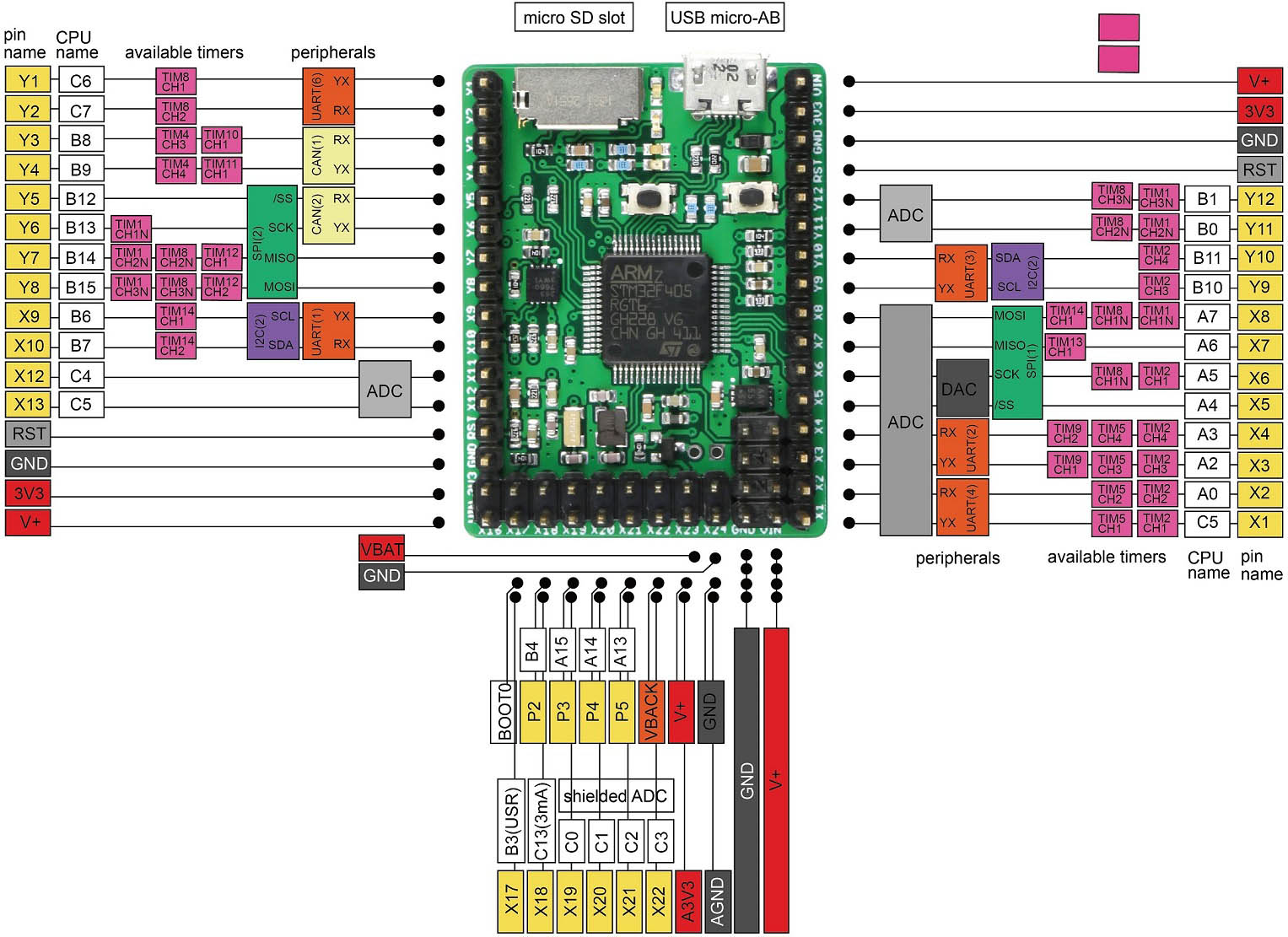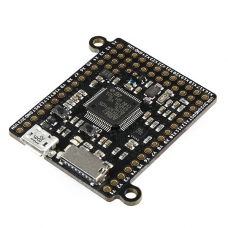MicroPython PyBoard v1.1
Reward Points: 0
Availability: Out Of Stock
20 or more $25.70
MicroPython is a lean and efficient implementation of the Python 3 programming language that includes a small subset of the Python standard library and is optimised to run on microcontrollers and in constrained environments. The MicroPython pyboard is a compact electronic circuit board that runs MicroPython on the bare metal, giving you a low-level Python operating system that can be used to control all kinds of electronic projects. MicroPython is packed full of advanced features such as an interactive prompt, arbitrary precision integers, closures, list comprehension, generators, exception handling and more. Yet it is compact enough to fit and run within just 256k of code space and 16k of RAM. MicroPython aims to be as compatible with normal Python as possible to allow you to transfer code with ease from the desktop to a microcontroller or embedded system.
MicroPython is a full Python compiler and runtime that runs on the bare-metal. You get an interactive prompt (the REPL) to execute commands immediately, along with the ability to run and import scripts from the built-in filesystem. The REPL has history, tab completion, auto-indent and paste mode for a great user experience. MicroPython strives to be as compatible as possible with normal Python (known as CPython) so that if you know Python you already know MicroPython. On the other hand, the more you learn about MicroPython the better you become at Python. In addition to implementing a selection of core Python libraries, MicroPython includes modules such as "machine" for accessing low-level hardware.
The pyboard is a compact and powerful electronics development board that runs MicroPython. It connects to your PC over USB, giving you a USB flash drive to save your Python scripts, and a serial Python prompt (a REPL) for instant programming. Requires a micro USB cable. Works with Windows, Mac and Linux.
MicroPython is a complete re-write of the Python (version 3.4) programming language so that it fits and runs on a microcontroller. It includes many optimisations so that it runs efficiently and uses very little RAM.
MicroPython runs bare-metal on the pyboard, and essentially gives you a Python operating system. The built-in pyb module contains functions and classes to control the peripherals available on the board, such as UART, I2C, SPI, ADC and DAC. Watch this video for an overview of the pyboard.
There are 3 main ways to control the pyboard:
- REPL: Connecting to your PC via USB, the board appears as a USB virtual comms port (CDC VCP) and you can use any serial program to connect and get a Python REPL prompt. This allows you to instantly type and execute Python commands, just like you would when running Python on your PC. You can also redirect the REPL to any of the UARTs on the pyboard.
-
Remote script: You can change from REPL to raw REPL mode by sending ctrl-A, and then in raw REPL mode you can send an arbitrary Python script to the board for it to execute immediately. A Python script is available which makes using this mode very simple: you just run
python pyboard.py script_to_run.pyand this will executescript_to_run.pyon the pyboard, returning any output. -
From file: The pyboard has a small, built-in filesystem which lives in part of the flash memory of the microcontroller. It also has an SD card slot if you want to extend the available storage. When you connect the pyboard to your PC, it appears as a USB flash storage device and you can access (mount) the internal filesystem and the SD card this way. If you copy a Python script to the filesystem and call it
main.pythen the board will execute this script when it starts up. This way you can run scripts without being connected to a PC.
Main features of the hardware:
- STM32F405RG microcontroller
- 168 MHz Cortex M4 CPU with hardware floating point
- 1024KiB flash ROM and 192KiB RAM
- Micro USB connector for power and serial communication
- Micro SD card slot, supporting standard and high capacity SD cards
- 3-axis accelerometer (MMA7660)
- Real time clock with optional battery backup
- 24 GPIO on left and right edges and 5 GPIO on bottom row, plus LED and switch GPIO available on bottom row
- 3x 12-bit analog to digital converters, available on 16 pins, 4 with analog ground shielding
- 2x 12-bit digital to analog (DAC) converters, available on pins X5 and X6
- 4 LEDs (red, green, yellow and blue)
- 1 reset and 1 user switch
- On-board 3.3V LDO voltage regulator, capable of supplying up to 250mA, input voltage range 3.6V to 16V
- DFU bootloader in ROM for easy upgrading of firmware
The two mounting tabs on the pyboard have perforations so that you can snap them off cleanly if needed.
This pyboard comes in a small plastic ESD (anti-static) box.
Differences between PYBv1.0 and PYBv1.1: high-speed crystal changed from 8MHz to 12MHz; LDO changed from MCP1802 to MCP1703; USB VBUS power diode replaced with silicon diode; JST battery connector pads added with protection FET.

Write a review
Your Name:Your Review: Note: HTML is not translated!
Rating: Bad Good
Enter the code in the box below:






